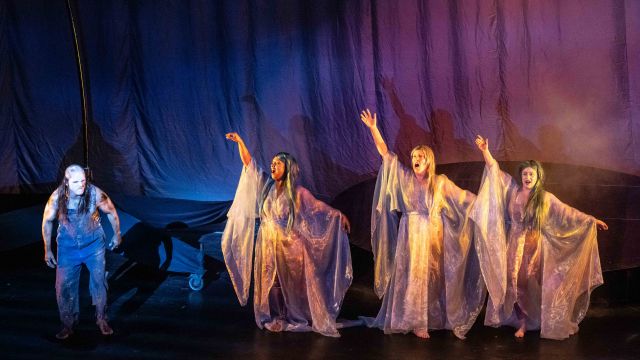Das Rheingold
My first experience with Wagner live was one cheekily cold autumn night in Berlin, a little over ten years ago. Running precariously in heels and finery through the streets, having mistaken the venue, I made it just in time for the doors to close, but hadn’t been able to get to the toilet – and didn’t realise there was no interval in Das Rheingold! (A word of warning – if this benighted pandemic ever ends and you get to see opera in Europe, they are VERY serious about the starting time!) I barely noticed my discomfort for the entire time, however, so transported was I by the spectacle and the music. I realised, then, that the Ring Cycle is not just a performance, it’s an event, and I felt the same sense of wonder on Wednesday night. While Melbourne Opera’s production may have been very different in setting and scale from the Berliner Staatsoper, as the first notes of the E-flat major chord sang out across the stately auditorium of the Regent Theatre, I could almost taste that crisp Berlin night.
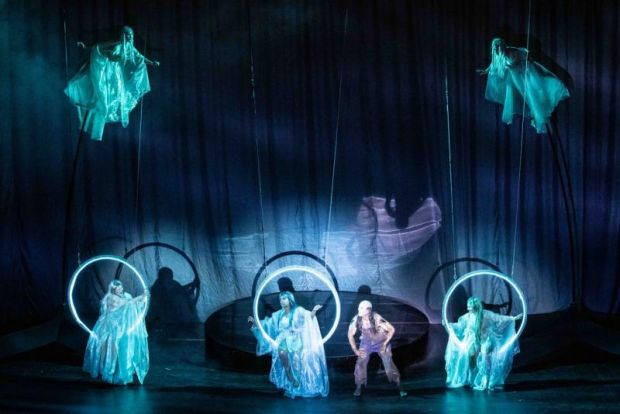
When Melbourne Opera first announced they were staging the Ring Cycle, I admit to some qualms about whether they would do a traditional, physical scenery set, or would rely on video projections – and if the latter, would it work? I needn’t have worried, as it happens. Intelligent and cunning choices about all aspects of production design rendered this a visual feast. My qualms about projections were soon laid to rest, particularly with the transition between the first and second scenes, which was flawlessly accomplished, the gigantic set unfurling and revealing more of itself as the opera progressed. Video projections were judiciously used to enhance the action and the scenery. I’d like to give a firm nod, not just to the set designers and builders, but to the technicians behind the scenes – the stagehands, the SM and ASMs, the LX and dome operators, and many others – who kept the whole show running smoothly. These unseen miracle workers have my heartfelt thanks for keeping some very talented voices safe amongst the epic scenery.
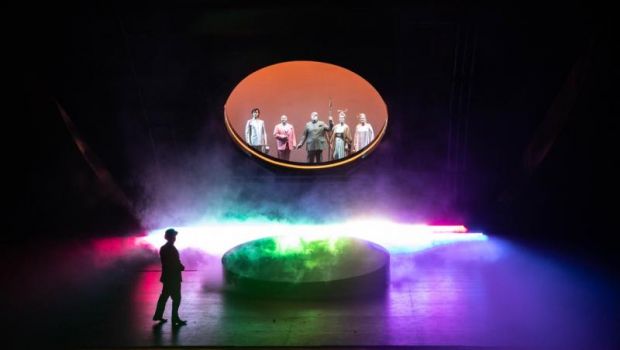
And so, to the music, and my goodness, there’s so much I could say! In a truly well-judged production of The Ring, the music and the visual spectacle complement each other, neither seeking supremacy, and this balance was very much in evidence. Perhaps the highlight of the evening was the chance to hear Eddie Muliaumaseali’i as Wotan, an unexpected pleasure given I had expected a different performer from the pre-show publicity. Muliaumaseali’i’s strong vocal abilities were in evidence from the first note to the last, and, if sometimes the orchestration slightly overpowered him, it was clear that this is a role he will be asked to sing many times into the future. In particular, Muliaumaseali’i’s physical characterisation of the scheming and selfish nature of Wotan was striking, especially played against the strong, yet beleaguered Fricka of Sarah Sweeting. The interaction between this central couple, who represent a major thematic element of the Ring Cycle in the tension between freedom and lawfulness, is difficult to pull off without Fricka being played to the trope of the nagging wife, and Wotan being played to the trope of philandering husband, when in reality both are much more complex characters. Fricka represents marriage, an aspect of law and structure, and Wotan is in theory a representative of lawfulness too. He uses the law and the spear he carries represents its power by virtue of the contracts inscribed thereon, yet he constantly chafes against its restrictions, particularly against the restrictions imposed by marriage. Sweeting’s Fricka perfectly draws forth this tension in Wotan, showing us the undercurrent of chaos in all his thoughts and deeds. The nuanced and layered interaction is aided by Sweeting’s sweeping vocal performance, which effortlessly cuts a swath through the challenging score. The special, unlikely bromance between Wotan and chaotic trickster Loge, played by James Egglestone in a worthy performance, forms the third point of this dangerous triad, pulling Wotan towards his true nature and against Fricka. Appearing almost like a refugee escaped from Wimbledon tea-time in his striped attire, Egglestone’s knowing, playful performance, was both dramatically convincing and vocally commanding. We see the beginning of the tension between lawful Fricka and Loge’s chaos that will play out in the next instalment of the Ring (despite the character, Loge, being absent from that opera).
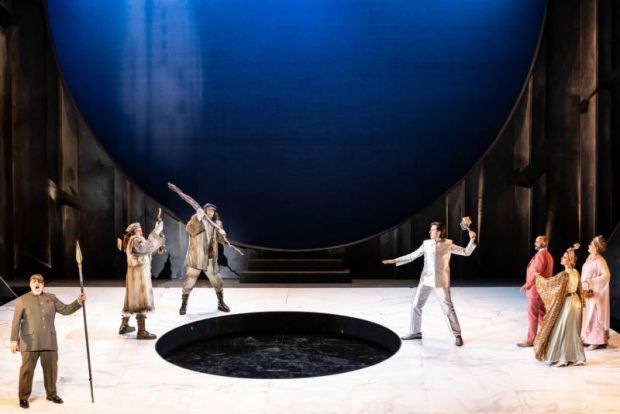
Of the remaining gods, plaudits must go to Jason Wasley and Darcy Carroll who made workmanlike efforts of their roles as Froh and Donner respectively, characters that, due to their unidimensional nature, are difficult to make much of, no matter one’s vocal or dramatic capabilities. Lee Abrahmsen likewise did well with Freia, a role that doesn’t have nearly enough scope to challenge her vocal abilities. One wonders what she could do with a role like Sieglinde.
Singing the saga’s universe into existence were the Rhinemaidens, performed by Louise Keast, Karen van Spall, and Rebecca Rashleigh, with perfect, crisp consonants and luscious harmonies. The three gracefully floated, physically and vocally, around the stage and, if there were some minor intonation issues with the offstage singing, their on-stage work was as perfect as their sneering contempt and thoughtless cruelty towards Alberich. Speaking of whom, we were treated to a dynamic and enthralling interpretation from Simon Meadows as the titular Nibelung of the Ring Cycle, which was warmly appreciated by the opening night audience. Meadows started somewhat quietly but was soon in full voice and his cursing of the ring was almost visceral in its emotional impact. As Alberich’s unfortunate, wheedling brother, Mime, Michael Lapina brought an unexpected burst of energy to the stage, singing with clear, precise diction and excellent intonation throughout.
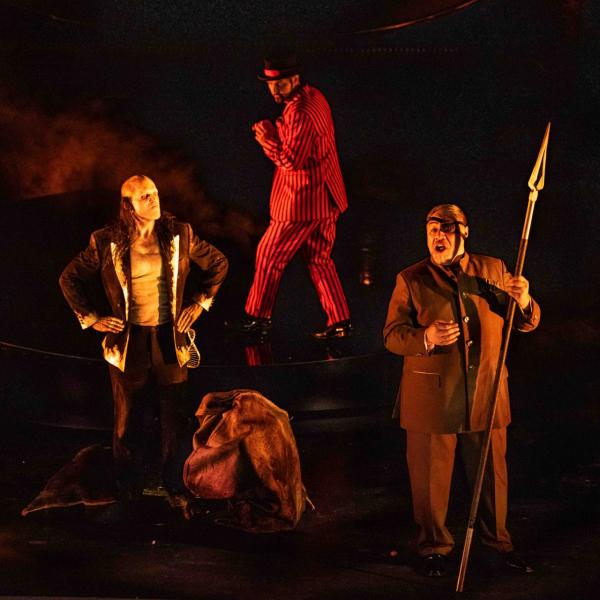
The Giants, Fasolt and Fafner, portrayed by Adrian Tamburini and Steven Gallop respectively, were suitably impressive both vocally and physically, although how costume designer Harriet Oxley managed to make them appear physically much bigger than the other performers is not immediately apparent – possibly some kind of magic trick? Finally, Roxane Hislop made a striking cameo as earth mother Erda, floating almost like a spirit on and off stage with her dire warning to Wotan.
Keeping the whole performance stitched together is no small task in Wagner, where there can be a tendency for it to develop into an Orchestra v. Singers situation. No fear of that with Anthony Negus at the helm. Maestro Negus deftly conducted the ninety-plus piece orchestra and kept the singers on cue throughout with the light touch that comes from his decades of experience with the oeuvre.
Director Suzanne Chaundy and her team have pulled off the seemingly impossible – a small company creating a fully-staged Das Rheingold (and the rest of the Ring, hopefully, in future years). Truly a worthy addition to the annals of Ring history. See it while you can.
Catherine MacCallum
Photographer: Robin Halls.
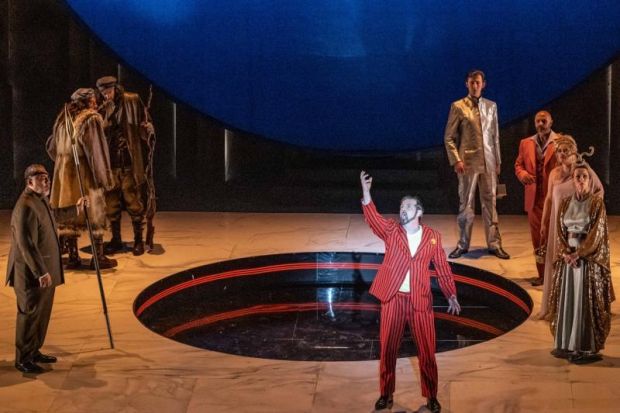
Subscribe to our E-Newsletter, buy our latest print edition or find a Performing Arts book at Book Nook.

